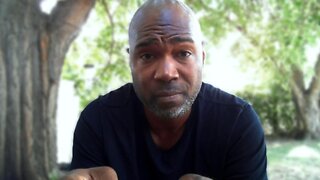Premium Only Content

The Moroccan's slave's King's speech.
The French protectorate in Morocco,[4] also known as French Morocco, was the period of French colonial rule in Morocco that lasted from 1912 to 1956.[5] The protectorate was officially established 30 March 1912, when Sultan Abd al-Hafid signed the Treaty of Fez, though the French military occupation of Morocco had begun with the invasion of Oujda and the bombardment of Casablanca in 1907.[5]
The French protectorate lasted until the dissolution of the Treaty of Fez on 2 March 1956, with the Franco-Moroccan Joint Declaration.[6] Morocco's independence movement, described in Moroccan historiography as the Revolution of the King and the People, restored the exiled Mohammed V but it did not end the French presence in Morocco. France preserved its influence in the country, including a right to station French troops and to have a say in Morocco's foreign policy. French settlers also maintained their rights and property.[7]
While the agreements with France had provided for interdependent foreign relations, Franco-Moroccan relations quickly worsened following Mohammed V's outspoken support for Algerian independence including at the United Nations.[8] The number of French settlers declined constantly,[9] especially after their agricultural holdings were nationalized.[10] Relations with France were to improve once the last French troops finally left Morocco in November 1961.[11]
The French protectorate existed alongside the Spanish protectorate, which was established and dissolved in the same years; its borders consisted of the area of Morocco between the Corridor of Taza and the Draa River, including sparse tribal lands.[12] The official capital was Rabat.
Prelude
Further information: France–Morocco relations
The Maghreb in the second half of the 19th century
Despite the weakness of its authority, the 'Alawi dynasty distinguished itself in the eighteenth and nineteenth centuries by maintaining Morocco’s independence while other states in the region succumbed to French or British domination. However, in the second part of the nineteenth century, Morocco’s weakness and instability invited European intervention to protect threatened investments and to demand economic concessions. Following the Hispano-Moroccan War of 1859–1860, Spain obtained the recognition by Morocco of its perpetual sovereignty over Ceuta, Melilla and the Chafarinas Islands as well as of the territory of Ifni. The first years of the twentieth century witnessed a rush of diplomatic maneuvering through which the European powers, France in particular, furthered their interests in North Africa.[13]
-
 2:18:15
2:18:15
Badlands Media
3 hours agoOnlyLands Ep 25
47K16 -
 2:05:01
2:05:01
TimcastIRL
6 hours agoTrump Just Ended H1B Visas In Major Crackdown, Charging $100k Per Visa | Timcast IRL
264K166 -
 4:02:20
4:02:20
Nerdrotic
12 hours ago $13.85 earnedKimmel MELTDOWN | Hollywood Boycotts Disney | Friday Night Tights 372 with Kaida
109K19 -
 34:08
34:08
Bannons War Room
6 hours agoMEGYN KELLY: Jimmy Kimmel and Sore Cultural Losers, and Charlie Kirk's Spiritual Revival, w/ Bannon
70.3K74 -
 59:27
59:27
NAG Podcast
7 hours agoBrandon Straka: BOLDTALK with Angela Belcamino
63.7K11 -
 59:43
59:43
Sarah Westall
5 hours agoVietnam Shuts down 86 Million Bank Accounts, The Fourth Turning & more w/ Andy Schectman
46.4K11 -
 1:17:51
1:17:51
Flyover Conservatives
12 hours agoMary Flynn O’Neill and Clay Clark: The Church Must Rise or America Falls | FOC Show
36.8K4 -
 3:36:01
3:36:01
I_Came_With_Fire_Podcast
14 hours agoThe Global ANTIFA Connection You've Never Heard Of | The Israel Question
29.4K7 -
 16:38
16:38
RTT: Guns & Gear
22 hours ago $2.73 earnedExtar EP9 Review: The Best Budget 9mm PCC?
46.6K6 -
 7:53
7:53
Rethinking the Dollar
15 hours agoMass Firings in Tech: The Real Agenda Behind 166,000 Cuts
53.4K11